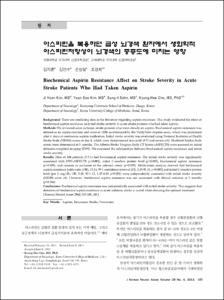아스피린을 복용하던 급성 뇌경색 환자에서 생화학적 아스피린저항성이 뇌경색의 중증도에 미치는 영향
- Alternative Author(s)
- Sohn, Sung Il; Cho, Kyung Hee
- Journal Title
- 대한신경과학회지
- ISSN
- 1225-7044
- Issued Date
- 2011
- Abstract
- Background: There are conflicting data in the literature regarding aspirin resistance. This study evaluated the effect of biochemical aspirin resistance on initial stroke severity in acute stroke patients who had taken aspirin.
Methods: We reviewed acute ischemic stroke patients who were already on aspirin. Biochemical aspirin resistance was defined as an aspirin reaction unit score of ≥550, as evidenced by the VerifyNow-Aspirin assay, which was performed after 4 days of continuous aspirin medication. Initial stroke severity was evaluated using National Institutes of Health Stroke Scale (NIHSS) scores at day 4, which were dichotomized into mild (0-7) and severe (≥8). Modified Rankin Scale scores were determined at 3 months. The Alberta Stroke Program Early CT Scores (ASPECTS) were assessed on initial diffusion-weighted imaging (DWI). We examined the relationships between biochemical aspirin resistance and initial stroke severity.
Results: Nine of 106 patients (8.5%) had biochemical aspirin resistance. The initial stroke severity was significantly associated with DWI-ASPECTS (p<0.001), initial C-reactive protein level (p=0.005), biochemical aspirin resistance(p=0.009), and stenosis or occlusion of the relevant artery (p=0.029). Multivariate analysis showed that biochemical aspirin resistance [odds ratio (OR), 15.24; 95% confidence interval (CI), 2.49-93.31; p=0.003] and initial C-reactive protein level (per 1 mg/dL; OR, 2.43; 95% CI, 1.47-4.00; p=0.001) were independently associated with initial stroke severity(NIHSS score ≥8). However, biochemical aspirin resistance was not associated with clinical outcome at 3 months(p=0.366).
Conclusions: Biochemical aspirin resistance was independently associated with initial stroke severity. This suggests that detection of biochemical aspirin resistance in acute ischemic stroke is useful when choosing the optimal treatment.
- Alternative Title
- Biochemical Aspirin Resistance Affect on Stroke Severity in Acute Stroke Patients Who Had Taken Aspirin
- Department
- Dept. of Neurology (신경과학)
- Publisher
- School of Medicine
- Citation
- 김지훈 et al. (2011). 아스피린을 복용하던 급성 뇌경색 환자에서 생화학적 아스피린저항성이 뇌경색의 중증도에 미치는 영향. 대한신경과학회지, 29(4), 303–308.
- Type
- Article
- ISSN
- 1225-7044
- Appears in Collections:
- 1. School of Medicine (의과대학) > Dept. of Neurology (신경과학)
- 파일 목록
-
-
Download
 oak-bbb-2303.pdf
기타 데이터 / 440.97 kB / Adobe PDF
oak-bbb-2303.pdf
기타 데이터 / 440.97 kB / Adobe PDF
-
Items in Repository are protected by copyright, with all rights reserved, unless otherwise indicated.